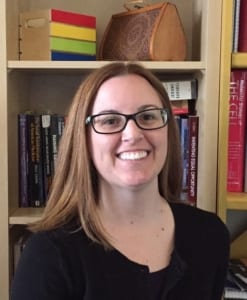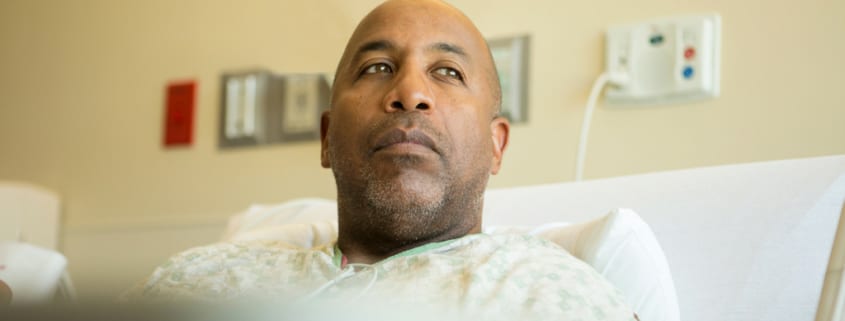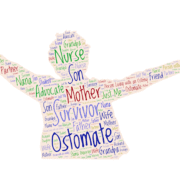Study Shows Patients Need More Ostomy Information
49% of Respondents Report they Received Inadequate Information and Communication From their Provider at the Hospital
By Leslie Riggle Miller, M.A.
My name is Leslie Miller and I am a 25-year cancer survivor and a former ostomate. I had a partial colectomy at age sixteen in 1993 resulting from a cancerous tumor attached to the rectum. I was given a colostomy, for which I had never heard of before I woke up with one! Nine-reconstructive surgeries later, I received a takedown (reversal of colostomy) in 1997. Now, three lives later I am doctoral student at the University of Oklahoma in the Department of Sociology. My primary research area is Medical Sociology.
I am excited to share with you some preliminary results of a very important study on the lives of ostomates. I began this research project in the summer of 2017 called Peoples’ Experiences With Pouches (1.) (P.E.W.P.) Study. I am interested in the difficulties ostomates face in their everyday lives, as well as the level of supportive care they receive in current medical practice. Long-term goals include improving hospital processes and nurse training with respect to ostomy care and instruction.
Background: An important component of our healthcare system is when patients and providers meet and interact together. During this interaction, patients are able to explain their ailments and tell their story, and providers are able to provide care, instruction, and diagnoses. There are positive and negative outcomes for patients based on this interaction, such as patients feeling heard, respected and cared for, but also there can be patient dissatisfaction, lack of trust, and misdiagnoses. Effective communication from providers is not only critical for all patients, but possibly more so for patients who receive a life-changing surgery, such as an ostomy.
The communication from providers when ostomates first receive their appliance is critical. Provider communication not only needs to be effective for ostomates’ ability to go home and take care of their appliance, but also it needs to be efficient given the short turnaround time in release from the hospital. As such, in my study, I examine provider communication and information when ostomates first receive their appliance.
Study Background and Results: Currently, there are 391 ostomates from the U.S. and abroad included in the study. 89% reside in the U.S. with 11% residing outside of the U.S. (predominantly from the United Kingdom and Canada).
The research questions that I have addressed are based on ostomates’ initial experiences at the hospital when they first receive their ostomy. The research question that I will address in this post is, “Do ostomates receive adequate information and communication from providers while at the hospital?” The answer to this question is “no.” I found that almost half (49%) of the ostomates felt that they received inadequate information and communication from their provider at the hospital. Below are the areas of provider care that ostomates reported that they either did not receive or an inadequacy in care that they experienced:
- Attitude. The provider said something that hurt the patient’s feelings or acted in a way that dissatisfied the patient, such as the provider was arrogant or rude.
- Ostomy Nurse. The patient wanted to see an ostomy-specific nurse sooner than they did or have follow-up appointments with an ostomy nurse but did not get to.
- Providers Lacked Knowledge. Patients felt that providers were not educated enough about ostomy care or were lacking in their knowledge on ostomies.
- Products. Patients were not told that there were other products on the market that may work better for their type of stoma or situation.
- Preoperative Information. Patients did not receive pre-op information or wanted more preparation before surgery.
- Fixing Issues. Patients were not told how to fix issues that arose once at home.
- Supervise Pouch Change. Patient wanted to be supervised on how to change the pouch or more practice with changing it with an ostomy nurse or more practice changing it, in general, before going home but did not get to.
- Wrong Information. Patients were told the wrong information from providers.
- Missing Information. Patients were not told all of the information that they needed or wanted on how to care for their ostomy or other options available.
- Lacked Support Information. Patient wanted to be told about ostomy support groups or links to support information or meet with a current ostomate, but did not receive this.
- Lacked Emotional Support. Patient did not receive any emotional support from their provider and they wanted to.
- Questions. Patients had questions that were not answered at the hospital, or they wanted to call to ask questions.
- Hurried/Dismissed. Patients felt like the nurse was hurried, or the patient did not receive overall basic care, making them feel as if they were dismissed.
A majority of ostomates felt that they did not receive all of the information that they wanted or needed, with lacking product information as the second highest category for inadequacy.
Additionally, I examined whether provider communication and information were better or worse for ostomates who received their ostomy years ago versus more recently. The years of ostomy surgery ranged from having had surgery in 1953 to 2017. I found that the further back in years the ostomate had their surgery, the more likely they were to report adequate information and communication. This finding leaves us with additional questions, such as whether the quality of hospital provider care has decreased over time? What is driving this decrease in adequate information and communication for ostomates? I plan on determining the answers to these questions in future studies.
Closing Remarks: The main takeaway is that there is much work to be done with regard to ostomy care when people first receive their pouch. We hope our study (and future studies on this topic) will help in this endeavor. Finally, I encourage all of you to be active participants in your medical encounters when you meet with providers. It is important to ask questions and have an open dialog with your provider. The UOAA offers vast resources for new and seasoned ostomates. In particular, the UOAA has a “patient bill of rights” so that ostomates have the tools they need to advocate for their care. Please visit https://www.ostomy.org/bill-of-rights/ to see this great resource. You are welcome to reach out to me if you have any questions
1. Miller, Leslie Riggle and B. Mitchell Peck. 2018. Peoples’ Experiences With Pouches (P.E.W.P.) Study: Examining Whether Ostomates Receive Adequate Information from Hospital Providers. Presented at the Oklahoma Sociological Association Annual Meeting, Norman, Oklahoma, November 2017

Leslie Riggle Miller, M.A. is a former ostomate and a doctoral student at the University of Oklahoma in the Department of Sociology.

 canva
canva










We need a flier or brochure to send to all providers with information regarding pre-op teaching and how important an ostomy support is through support groups after surgery
Do you have any such inform brochure that we could adapt to our area ?
The Living with an Ostomy brochure is basic but currently has a spot on the back to include local support group info. Our Ostomy New Patient Guide is more comprehensive information and available to all. The brochure can be found here. https://www.ostomy.org/living-with-an-ostomy/ New Patient Guide is here. https://www.ostomy.org/new-ostomy-patient-guide/
I have had an ostomy for the past 7 years. Previously, I had worked as a pharmacy student in a pharmacy sending out supplies to patients (without any information about what I was doing), this was while I was going to Pharmacy school in the early 60’s. In the mid 70’s I worked in a hospital as a supervisor and one of the areas assigned to me was the GI department. I was again involved with the patients but got no training. Then, I married a gastroenterologist. 7 years ago while working as a hospital pharmacist, my colon burst at work. I was in the ER and OR in minutes and sent home without any information, just some supplies. A few months ago I started having problems with the supplies and I tried calling the hospital I currently am assigned to. Noone was available to help–my husband figured out the problem. I wonder how many patients do not get the information they need? There is noone to ask–
I had my colonoscopy August 2017. Bedside help at the hospital while I was loopy from anesthesia and meds and could hardly keep my eyes open is all I had before I was released. I felt very ignorant about what was before me. All I could do was keep re-reading the printed Info I was given and hope for the best. low self esteem and nervous tension regarding self help were my companions.I prayed a lot and God was with me.
I had my surgery 3 years ago in York Pa. as it was emergency surgery , and I was a real sick pup , I got virtually no prep. for what was to come . 17 days in ICU , and 10 days in an rehab hospital provided almost no help . The supplies they sent me home with were junk , and the Homecall nurses knew nothing . I got 99% of my information from the net . Coloplast has been great , their Ostomy nurses really know there stuff . I can call for info anytime . They send me samples , and keep me up on what’s new .
Hi,
I would like to thank everyone for writing comments and to Leslie for the wonderful research paper. I felt the list of the 13 areas that providers lacked sharing properly to their patients. Reading the list was like reading a biography of mine! My family was simply horrified at the small amount of time spent preparing me for how to deal with my ileostomy when I returned home. Some nurses informed me they didn’t know enough about ostomies and told me they would find a nurse who knew more about them. My ostomy nurse told me that all floor nurses should know about this subject because it was required in nursing school. I was also not informed of any support groups in the area, but when I got home I looked on the internet and there was a support group at the same hospital I was in!
Thank you for listening to my comments and complaints! lol. I have only about 4 months of ostomy experience under my belt, but please feel free to email me if you have any questions. My address is richhughes1968@outlook.com.